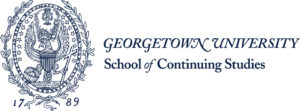
In the next five years we see a continuation of the trend to analyze and synthesize more and more data to make informed but meaningful marketing decisions.
With an extensive background in corporate global communications, Wendy Zajack now shapes the minds of graduate students studying marketing and communications at Georgetown University's School of Continuing Studies. Through the courses she teaches, Zajack helps students find their voice within the ever-expanding world of advertising, marketing, and communications. Focusing on innovation and creativity, Georgetown's programs offer students the freedom to explore the communications field with a strong understanding of the industry and the ability to grow along with the fast-paced market and clientele. Read on to find out more about Zajack and about Georgetown's offerings within this highly desirable career field.

Tell us about your background.
Wendy Zajack is currently the Faculty Director and Assistant Professor of the Master’s in Design Communications Management and Integrated Marketing Communications programs at Georgetown University’s School of Continuing Studies. She teaches a number of graduate courses in the program including: Conversation in Ethics, Collaboration Lab, a Global Immersions course, and Capstone (the final course in the program).
Before joining academia, Zajack had a 20-year corporate career working for large, global organizations building messaging for multiple audiences and using a variety of marketing channels including Reuters, Alcatel-Lucent, and Nokia. She now brings her extensive experience into the classroom and helps her students explore new and innovative ways to market and communicate in an increasingly crowded business environment. She earned her bachelor’s degree in Public Relations from Syracuse University and her MBA from New York University.
What differentiates your MIC (Masters in Communications) program from other schools?
Georgetown’s Master of Professional Studies in Integrated Marketing Communications (IMC) is an applied program focused on giving students skills and knowledge at the intersection of strategy and creativity. With our home base in Washington, D.C., as well as our Jesuit heritage, we deliver a world-class professional education where students learn from cutting-edge professionals and simultaneously develop a strong moral compass to apply to their work.
We want our students to recognize that understanding their audience and coming up with a deep meaningful insight around what their audience needs and wants is a hallmark of great marketing. Once this is achieved we help them continue to hone and create strategies to reach their goals.
Since we are part of a larger family of communications Master’s programs including Public Relations & Corporate Communications, Journalism, Global Strategic Communications, and a new Design Management Communications program launching Fall of 2018, our students also have the opportunity to take electives in some of our other programs to explore related areas of interest and develop complementary skills.
Talk to us about the class sizing and curriculum of the MIC offering?
We pride ourselves on delivering customizable, flexible student-centered education both online and on campus with small class sizes—usually under 20 students. The IMC program is built around creating great brands, messages, and products that meet the needs of consumers, as well as figuring out the strategies and channels that can be used to execute those plans. We explore traditional channels (advertising, events, public relations, and direct mail) with digital channels (web, email) and social media channels, with an eye toward whatever may come next. With these, our students learn to create a cohesive and strong brand story and message.
We believe these are critical underpinnings for students to understand and master to be successful in the rapidly changing marketing scene. We are a 33-credit program (11 three-credit classes) with five required classes: Conversations in Ethics, Consumer Research & Insights, IMC Campaign Planning, Brand Concept, and Capstone (taken at the end of the program, where students work with a real client to prepare an IMC plan). We also offer a number of electives focusing on various key elements of marketing, including creativity, leadership and business strategy, and digital channels and analytics. In addition, we offer client-facing courses where students work in teams to support client projects as well as a global client travel course.
Why should a student come to your school to get their MIC?
The world is changing, and so is the industry. Never before have professionals needed such a breadth of knowledge to succeed in the workplace. We aim to provide our students with a great balance of strategy and creativity. This helps them learn to combine key marketing fundamentals with cutting-edge techniques they can immediately apply in their careers now—techniques that will also help them build for the future. We bring this to life in the classroom (on-ground or virtual) with a world-class team of adjunct faculty who are able to connect the course teachings with their own unique experiences and examples.
We strive every day to ensure the program is meeting the needs of our students. This means when we are not on campus we are actively networking within the D.C. community and beyond to learn more about our industry and the new techniques and technologies that are shaping the future.
Our graduates are currently working in industries that are extremely diverse ranging from hospitality to technology to non-profits and higher education.
What job related industries are your students focusing on post-graduation?
The great news for marketers and communicators is our skills are not limited to particular industries—our graduates are currently working in industries that are extremely diverse ranging from hospitality to technology to non-profits and higher education.
Georgetown has an amazing (and supportive) network of alumni around the country and the globe. For those located in the D.C. metro area, we have a number of local events to help our alumni students stay in touch and keep connections going. Learn more about masters in communication career options.
What type of internships does your program provide?
We do not offer a standard internship program, however if students wish to engage in an internship during their time at Georgetown we are able to support that as a part of their credits while in the program.
In addition, we do offer a number of client-facing classes where students work on real problems as part of our curriculum, including our signature Capstone course (taken at the end of the program), where students work the entire semester with one client of their choosing to create an integrated marketing plan.
Tell us about your faculty. What are the characteristics do you focus on to lead your programs?
The professional strength and breadth of knowledge of our faculty, their willingness to connect with students, and the powerful networks they bring have proven time and time again to be a great launching pad for our students. As we are a program with primarily working students, the connections students make with one another in and outside of classes have also proven to be incredibly useful from an academic and professional standpoint. Many times these connections lead to new job opportunities or leads. Both our on-campus and online students get to know each other and their faculty members to form meaningful and lasting connections. Because we are based in a large, international city, we also are able to bring in excellent guest speakers (both in classrooms and in a larger setting) who are able to interact with students.
Benefits for students pursuing online MIC as opposed to on campus?
Our online program gives students the flexibility of pursuing a top-notch communications education from a leading university without having to move across the country or around the world. Online education—and its asynchronous format—allows our students to learn on-demand at times throughout the day and week that work best for their schedules. In some cases, this may enable better work-life balance while delivering all of the same benefits of our on-campus program, including networking opportunities, world-class faculty, small class sizes, and courses that are designed to best facilitate learning online.
Online Programs - Prospective students may worry online education sacrifices personalized learning for convenience. How do online schools support students, particularly within self-directed programs? What can instructors do to ensure students feel connected?
At Georgetown we are committed to providing an online experience that mirrors our on campus program. A huge component of a professional Masters education is building a strong network with both faculty and other students. Each of our online courses is purposefully built to include engagement with both faculty and other students via discussion boards, group project work, and live (and recorded) sessions with faculty that can be scheduled throughout the semester.
What is the goal for the MIC program? Where do you see it in the next 5 years?
First and foremost, we want to continue to attract the best and brightest students and faculty to create an energized and nurturing learning environment where students are free to explore their passions and strengthen their weaknesses. Since marketing is a field that continues to change rapidly, we aim to arm our students with core principles that will never be outdated—the need for understanding and empathy for the behavior of your consumer, the ability to identify great insights, and the understanding and development of great creative strategies. Because we are a program that leverages working professionals as adjuncts, we are fortunate that the latest and greatest strategies, insights, and technologies are being brought into the classroom. That being said, we continue to look at areas for our students to grow.
In the next five years we see a continuation of the trend to analyze and synthesize more and more data to make informed but meaningful marketing decisions; however, this needs to be balanced with exceptional strategy and impactful creativity.
What geographical outreach does your program have? Are your students more local? Out of state?
As working professionals, most of our students on campus are from the DC/Virginia/Maryland area. We do also attract a fairly sizable international group from Europe, Central and South America, and Asia. Online, our students come from across the U.S. and increasingly around the world.
